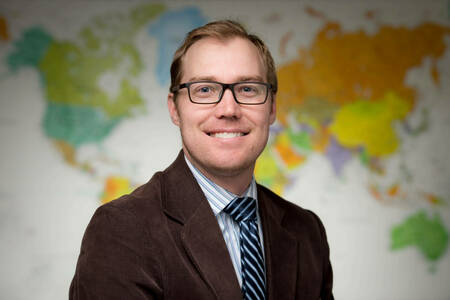Paul Perrin is the Director of Evidence and Learning for the Keough School's Pulte Institute for Global Development and an Associate Professor of the Practice in Global Health/Global Affairs. He is an affiliate of the Eck Institute for Global Health and teaches courses for the Master of Science in Global Health program. Perrin has a Ph.D. in International Health from Johns Hopkins University Bloomberg School of Public Health and an MPH in Public Health from Brigham Young University. During his career, he has worked as a senior technical advisor for health research at Catholic Relief Services and as an associate in the Johns Hopkins Center for Humanitarian Health. In this spotlight Q&A, Professor Perrin talks about his current work in global development and his aspirations in the field.

Q. Tell us about your research project(s). How did you become interested in the field?
A. I am currently PI or Co-PI on 9 research or implementation projects. They range in topics: creating an evidence gap map and evidence briefs on private sector engagement in global development and humanitarian work; researching the concept of what it means to be a dignity affirming program or organization; developing a toolkit for researcher/practitioner partnerships in global development work; developing a data dashboard for the State of Indiana around the sustainable development goals; understanding the role of higher education institutions in international innovation ecosystems, and developing and leading an online course for global development practitioners around the use of evidence in their work.
Q. What do you think are your most significant research accomplishments to date?
A. We have successfully generated several fruitful partnerships with public sector, private sector, and non-governmental organizations who are seeking a more humane, sustainable world. Through these projects, we have been able to provide many students with the opportunity to meaningfully contribute to initiatives that are shaping the policy and practice of this kind of work. But of all the projects that I am implementing, the one that resonates the most with me is contributing to a better understanding of human dignity, which encourages us all to hold ourselves accountable to better uphold that dignity while we shape the world we want to live in.
Q. What do you find to be the most rewarding aspect of training students?
A. I think the vast majority of the students at Notre Dame that I have been able to interact with within the classroom and in our projects are an extraordinary group of people who are simultaneously very intelligent and gifted while also maintaining a strong desire to contribute to a more just world wherein people can thrive. It is energizing to me to be surrounded by and engaged with people of this type.
Q. What is your favorite thing about the University of Notre Dame?
A. The commitment the university has to Integral Human Development, or in other words to the development of the whole person and of all people. This creates the space to grapple with issues that in other institutions might be too obscure or non-concrete to grapple with. However, the question of what it means to flourish not only as individuals, but also as a species, is relevant to the lives of the billions of people on this planet, and we must engage with these topics.
Q. What are your plans for the future? What do you hope to accomplish with your current projects?
A. I hope to expand our research on the affirmation of dignity to our work in monitoring and evaluation, as well as to management practices and policies of global development projects and organizations across the world. I envision where we not only seek to achieve objective markers of human progress—such as reducing infant mortality, expanding access to health care and education, or reducing the gender and race gap in various social and economic indicators—but also affecting this change in a way that affirms the dignity of those participating in these changes.